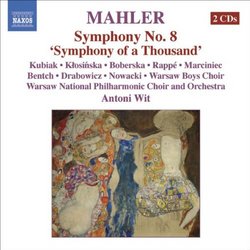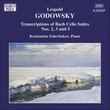| All Artists: Wojciech Drabowicz, Gustav Mahler, Antoni Wit, Warsaw National Philharmonic Orchestra, Barbara Kubiak, Izabella Klosinska, Marta Boberska, Timothy Bentch Title: Mahler: Symphony No. 8 "Symphony of a Thousand" Members Wishing: 0 Total Copies: 0 Label: Naxos Original Release Date: 1/1/2006 Re-Release Date: 4/18/2006 Genre: Classical Style: Symphonies Number of Discs: 2 SwapaCD Credits: 2 UPC: 730099553322 |
Search - Wojciech Drabowicz, Gustav Mahler, Antoni Wit :: Mahler: Symphony No. 8 "Symphony of a Thousand"
 | Wojciech Drabowicz, Gustav Mahler, Antoni Wit Mahler: Symphony No. 8 "Symphony of a Thousand" Genre: Classical
This new, budget recording rises right to the top of the list of available Mahler Eighths. Not only does Conductor Antoni Wit appreciate the work for its breadth and enormity; the superb recording--and apparently Wit's ear... more » |
Larger Image |
CD DetailsSynopsis
Amazon.com This new, budget recording rises right to the top of the list of available Mahler Eighths. Not only does Conductor Antoni Wit appreciate the work for its breadth and enormity; the superb recording--and apparently Wit's ear--captures a wealth of detail that is simply inaudible in most other recordings. It is one of the few recordings I can think of in which the organ does not sound overdubbed into the performance, mandolins and harps make just the right impression, and string parts are clear and clean. In addition, Wit's tempi seem ideal, neither rushed nor too leisurely. The choruses are superb--and superbly recorded--and the vocal soloists are, simply, the best on record. Most tenors sound strained, most of the time the soprano works too hard: here there's none of that. Vocal lines are finely sung, and the voices merge well, both with eachother and the choral and orchestral fiber. This is ravishing: very highly recommended. --Robert Levine Similar CDs
|
CD ReviewsVision and Ecstasy Eric J. Matluck | Hackettstown, NJ United States | 05/30/2006 (5 out of 5 stars) "It would be easy to say that this is the single greatest performance of the Mahler Eighth ever recorded; I believe it is. But it would be difficult to say that and have it mean something, because after experiencing this colossal achievement, the competition (including, alphabetically, Abbado, Bernstein, Chailly, Haitink, Horenstein, Kubelik, Nagano, Olson [Colorado Mahlerfest], Solti, and Tennstedt, among others) suddenly seemed far less impressive than they once had. What sets this Mahler Eighth so far apart from virtually every other is its sense of ecstasy; of a transcendent vision being communicated, of a religious fervor. Mahler had an extraordinary plan in putting together what he considered his most important work, such that he could bring us to the brink and say, "There. It's out there. You can't see it, but you can divine it" (and call "it" what you will: "God" or "Love" or some all-embracing power outside of ourselves). Most performances miss the mark, then, in one of two ways: by remaining resolutely earthbound or by trying to capture that vision in terms we can understand. The problem, of course, is that if we can understand it, it's no longer a vision, it's something mundane. In the closing pages of Wit's extraordinary (and that word, as well as any other, hardly begins to do it justice) performance you become aware of that vision existing just beyond your comprehension. You know it's there only because you're willing to take that leap of faith. And that's what I mean when I say he brings the piece a sense of religious fervor. There is nothing dogmatic about the kind of religion I'm referring to here. So let's look at the basic components of the performance, element by element: The sound: Spectacularly natural and all-encompassing. The soloists emerge from the overall sonic image like members of the orchestra, and the chorus, orchestra, and organ blend to perfection. The soloists: To a letter the finest group I have ever heard. There's a distinctly Slavic sound that seems altogether appropriate given Mahler's Bohemian roots, and a refreshing lack of self-importance. No operatic grandstanding here. And for the first time ever I felt as though I was missing something by not following the words (no libretto is provided, though it is available online and can be found easily enough elsewhere) because everyone sounded like they cared dearly about what they were singing. They weren't going through the motions, making pretty sounds. They had something imperative to communicate and wanted us to know it. To be honest, part II has often bored me to tears (with Chailly's performance being particularly offensive in this regard) but here I was literally on the edge of my seat throughout, impatient to hear what (and who) came next. And throughout it all, so importantly, there was a sense of spiritual ascent from beginning to end. The choruses: Easily the best I've ever heard. The way they rip into "Hostem repellas longius" with their shrieks in the great double fugue of part I is unforgettable, and the fugue itself, which has never reminded me more of the "rabble" section from the first movement of Mahler's Third, literally had my spine tingling throughout its entire course. That's nothing. I got chills right at the beginning of the Chorus Mysticus and six and a half minutes later they had not abated! I have NEVER experienced anything like that before. Ever. And I don't just mean while listening to music. The conductor: What can I say? He holds the symphony together with a tautness and logic that nobody ever credited this work with having before. How? I have no idea, but when the start of part II doesn't jar, as it usually does, you know you're in for something special. Maybe it's because the orchestral prelude there seems faster than usual, or because he finds so much inwardness in the first part (the first entry of the soloists, for instance, is so raptly caressing). The orchestra: While they don't have the "Mahler sound" that the Concertgebouw or Vienna Philharmonic may produce, there's an earthiness (but never sloppiness) that sets them far apart from the bleached, sterile sound of too many American orchestras that make Mahler sound not like Mahler. To sum up, then, I could not speak for an hour after hearing this recording, and still burst into tears at the mere thought of it, especially those radiant, visionary, and extraordinary closing pages. Record of the year; record of the century! It crowns not merely my Mahler collection but an entire lifetime of listening to great music. " One of the best. Alan Montgomery | Oberlin, Oh USA | 08/01/2006 (5 out of 5 stars) "There are plenty of Mahler 8ths out there. Considering the difficulty of the work, it is a wonder. I actually saw Solti perform the piece in Chicago before he recorded it. His performance is a benchmark. But this performance has many attributes that place it with the best. The soloists are all good, some with rather individual traits that make them stand out (a good thing!). Wit paces the performance with lyric intensity, without driving it as Bernstein and Solti did. The sound is some of the best Naxos has ever done. It is spacious, wide open acoustic, but it is clear and balanced. Quite an achievement." Head and heart in balance... Pater Ecstaticus | Norway | 06/29/2006 (5 out of 5 stars) "In the end, it may all depend on taste and on mood. There are many recordings (of about 40 existing total) of Mahler's Eighth Symphony which are considered almost automatically as 'the best Mahler Eight' by ever so many different people. (My favorites would be Abbado and Nagano, by the way...)
Aside from many other 'big' names like Haitink, Gielen, Kubelik, and Sinopoli, we have the 'early' classics like Horenstein (1959) and Mitropoulos (1960), the classic favourites of Bernstein (especially 1966 and 1975) and Solti (1971), (somewhat) more recent favourites like Tennstedt (1986) and Abbado (1994), and the 'latest additions' to the catalogue like Chailly (2000) and Nagano (2005) and now this, maybe to top it off, the recording on Naxos by Antoni Wit conducting the Warsaw National Philharmonic Choir and Orchestra and soloists. (We can only wait to hear what Pierre Boulez and Michael Tilson Thomas will have to say in the matter, but could it get much better than all that has gone before or that which has now been reached with, for example, Abbado, Nagano and Antoni Wit...?) ABOUT THIS RECORDING. This specific recorded performance has - I believe - many, many virtues (which outweigh any of its possible 'defects'), of which the most important is - at least to the ears of this particular listener - a sense of coherence and overarching vision. First of all, there is coherence in the music-making, as it is being nicely held together - in the aspects of tempi and phrasings - by the conductor, ever moving along purposefully, never sagging or revelling in the music for beauty's sake. Antoni Wit seems to have a clear sense of the need for stressing the drama behind the music. The conductor doesn't seem to want to relish in the beauty perse, bringing with it the danger of making it sound (overly) sweet or sentimental. Nonetheless, there ARE recordings out there that DO relish more in the gorgeous multicoloredness and deep sentiment of this music than this specific recording, but without succumbing to sentimentality, and which are IMHO an even finer success as the recording under review here - I especially think of Claudio Abbado and Kent Nagano. But please don't get me wrong, while Antoni Wit keeps tight enough rein on the proceedings to make all of the music sound 'of a piece', there is enough pure sentiment here, nonetheless, to keep 'both sides of the field' happy: there is sweet beauty and sentiment, held in balance with clarity and purposefulness. In line with - to my ears at least - his 'purposefully going forward' Antoni Wit doesn't stress the differences in tempi as much as other conductors might do here and there in the piece, especially Part II. This is a good thing in that it keeps the sense of forward momentum, of dramatic flow, inevitably towards 'das Ewig Weibliche'. But the playing here never sounds rushed or self-consciously '(micro)managed' by the conductor, which would IMHO be intolerable. (And there are of course such recordings out there - by much more 'renowned' conductors - which are held in high esteem by many. I will not name any names. But then again, many people also consider the rest of Antoni Wit's Mahler-cycle for Naxos as quite unremarkable ...) There are other reasons why this recording/performance sounds so wonderful, aside from coherence and tautness and balance between 'head and heart'. There is more, such as nice ensemble-playing: the whole orchestra sounds appropriately grand and massive, but at the same time, all the individual instrumental voices (be they groups or solo) are made to sing their lines within the orchestral textures, never being drowned out. A perfect sense of orchestral balance where every instrument is given full opportunity to shine when his time is there. (Is that which we experience/feel as 'sentiment' a result of just the 'right' amount of instrumental coloring and phrasing within a harmonious textural balance ...?) This sense of 'finely balanced ensemble' may also have to do with the recording-balances and the sound picture as such, in which the orchestra sounds 'cushoned' within a deep and wide soundscape, and as a result a bit 'woolly' sometimes (maybe too much so, compared with Solti, Chailly or Nagano?). Although, in tuttis, the sound never becomes congested, but always stays open. The choirs and (most of the) soloists are Polish, and while their pronunciation of German is sometimes a bit odd, they are all quite up to the task. The soloists are no A+ or 'star-voices' altogether. This does probably have the advantage that there is - to say it in the words of the previous reviewer - no 'operatic grandstanding'. But the singers are mostly just fine, some better than others. I am not going to compare with other recordings here - this performance must speak for itself, which it does eloquently enough, I believe. Only the Gretchen by Izabella Klosinska sounds just a bit (too) course/rough to really please the ears of this particular listener, which is a pity, but not so much as to cause a distraction, because, happily, her high notes are agreably natural and sweet enough. Timothy Bentch's Doctor Marianus to my ears has to struggle sometimes just a bit too much reach the highest notes, making them sound a little strained now and then, as if shouting. But although his singing is accomplished enough, in the end, I would not trade him in for likes of, for example, Rene Kollo (for Solti), Peter Seiffert (for Abbado), or Ben Heppner (for Chailly)? While there are many more 'high-profile' recordings out there that are maybe more 'distinctively accomplished' in specific aspects of conducting, music-making and singing, this is really only a matter of details (maybe even tastes) and as such would amount to nitpicking (even for Izabela Klozinska's not very 'beautiful' Una Poenitentium and Timoty Bentch's 'shouting' his high notes, when very specifically, a low volume is asked for in the score). There are not many recordings (even 'great' or 'classic' ones) which are consistently beautiful or artistically accomplished 'across-the-board'. And maybe, not many great recordings are better than this specific one of the forces from Warsaw conducted by Antoni Wit on Naxos. From beginning to end, in this recording, when one is susceptible to it, the listener's imagination and feelings are held captive in a compelling and ecstatic vision that is so wonderfully sustained from beginning to end, that, by the end, the final chorus mysticus really lifts the mind to higher spheres of emotion and ecstacy. Surely, there are even better recordings of Mahler's Eighth Symphony around. I would never like to be without my Abbado and Nagano performances, for example. But this is a nice recording in itself. At least 4 stars, then, for this sympathetic performance." |

 Track Listings (8) - Disc #1
Track Listings (8) - Disc #1


